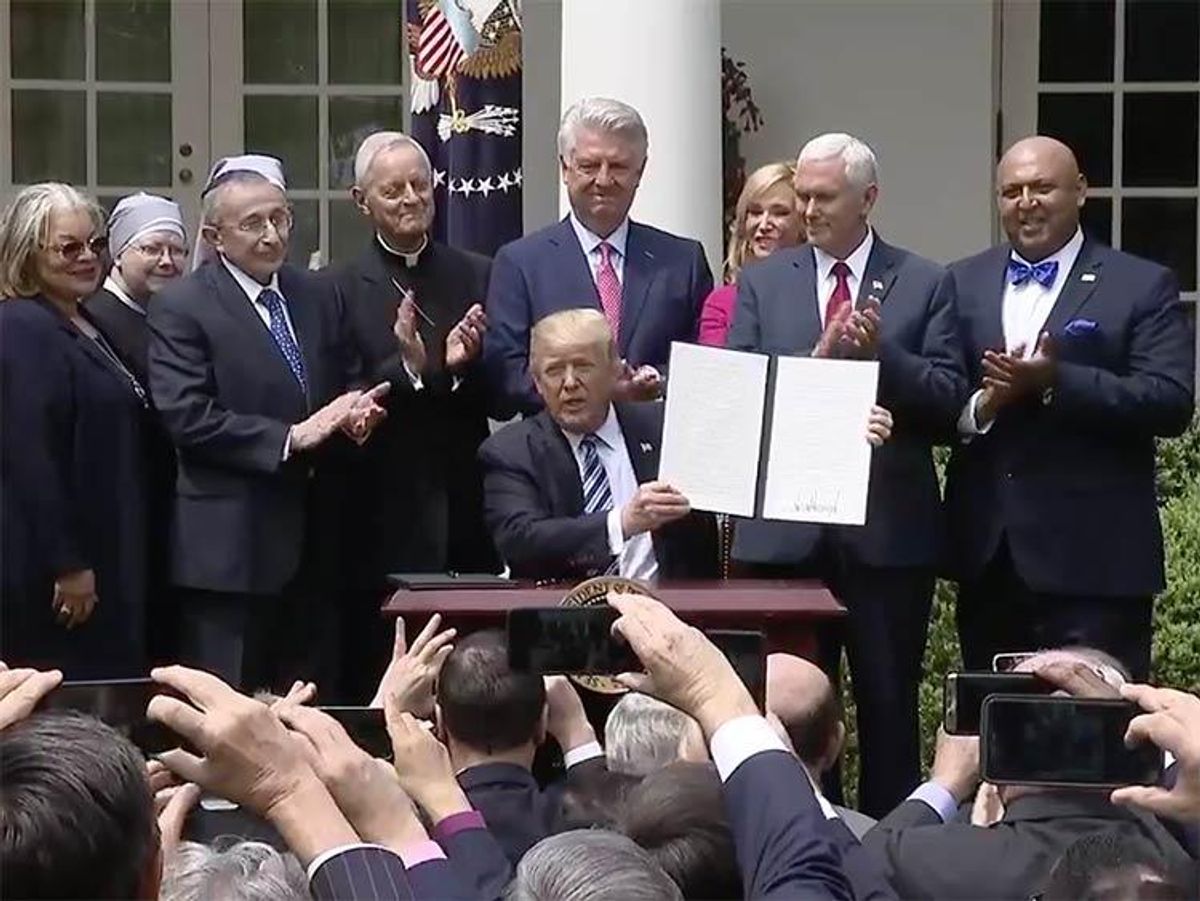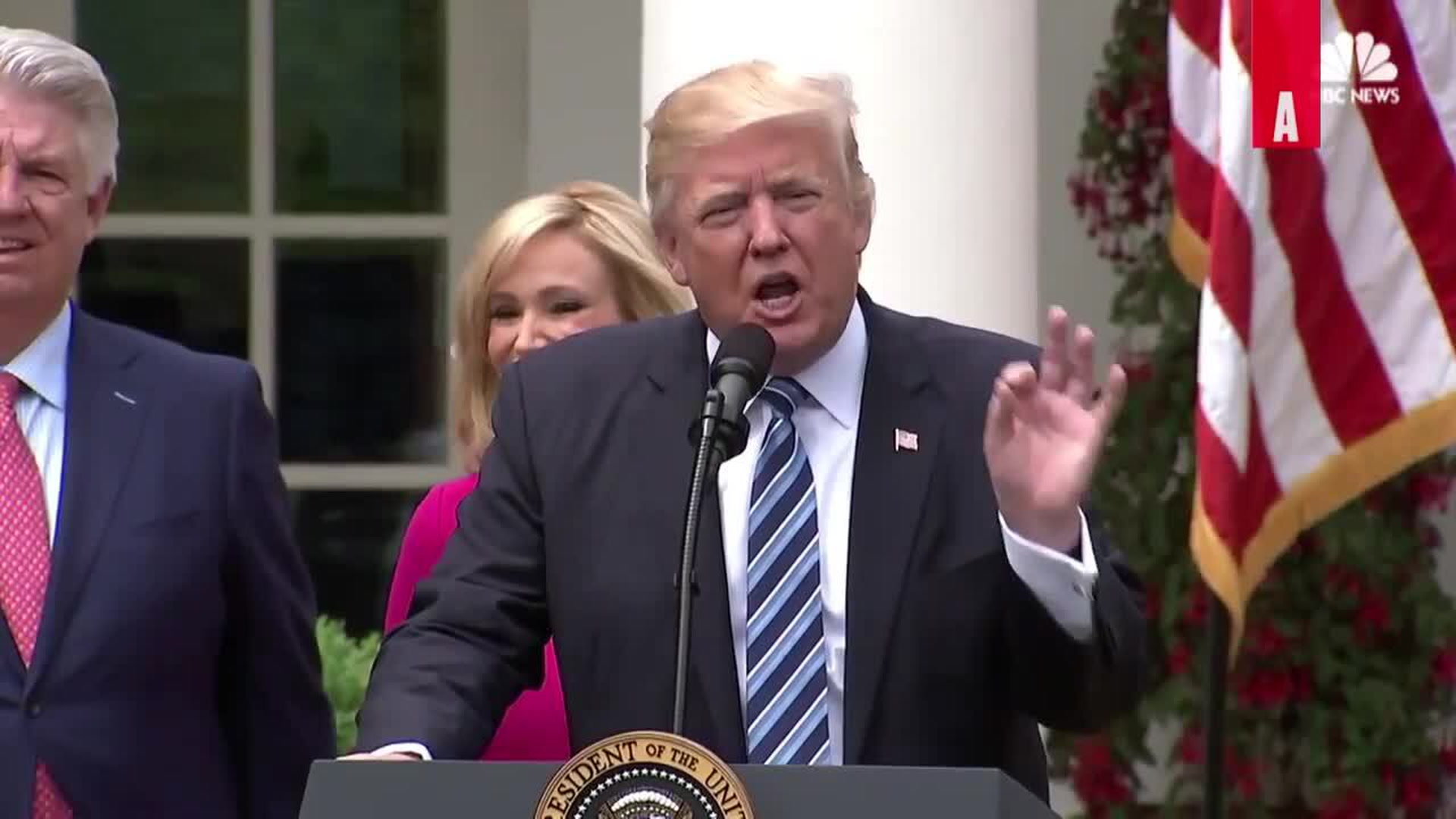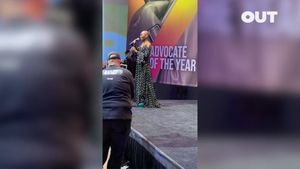Donald Trump didn't sign an anti-LGBT executive order, after all -- and some LGBT activists say public outcry influenced him not to.
But the order he issued today does direct the attorney general to prepare guidance on interpreting religious liberty provisions in federal law, something LGBT and other civil rights groups found troubling, along with the order's other contents, which address political speech by churches and contraceptive coverage in employer-provided insurance.
For the second time in his young presidency, word leaked to the media this week that Trump was about to sign a "license to discriminate" against LGBT people. It was eerily similar to what happened in February, when activists shared a leaked draft of the executive order first reported by The Nation and speculated on a raft of possible, far-reaching ramifications. Protests were threatened. Press secretary Sean Spicer was confronted in the daily briefing. Then it didn't happen.
This time, it was Politico reporting Tuesday that leaders on the religious right were anticipating the new religious exemptions as part of a National Day of Prayer event held at the White House today.
Groups including the Human Rights Campaign protested outside the White House on Wednesday, and nearly every LGBT activist group warned of more protests to come if the order came to fruition. Legal groups promised lawsuits. Social media lit up. Spicer was asked by the Washington Blade about the rumored order during Wednesday's briefing and avoided an answer.
By that night, though, both The New York Times and BuzzFeed were reporting the White House told reporters the president wouldn't sign a "license to discriminate" and instead would give church leaders more freedom to talk politics from the pulpit without threatening their tax-exempt status.
Today, that's what happened.
Trump signed the executive order on "Promoting Free Speech and Religious Liberty" in a Rose Garden event tied to the National Day of Prayer. It directs the Treasury Department to avoid "adverse action" against any individual, church, or religious organization that "speaks or has spoken about moral or political issues from a religious perspective, where speech of similar character has, consistent with law, not ordinarily been treated as participation or intervention in a political campaign on behalf of (or in opposition to) a candidate for public office." This is aimed at lessening the effect of the Johnson Amendment, which threatens the tax-exempt status of any church that endorses political candidates or makes campaign contributions.
The order does not include the "license to discriminate" language that presumably would've let businesses, nonprofits, and others cite their sincerely held religious belief when refusing to serve LGBT people or others who offend their beliefs about marriage, sexuality, birth control, or abortion.
It does, however, include this: "In order to guide all agencies in complying with relevant Federal law, the Attorney General shall, as appropriate, issue guidance interpreting religious liberty protections in Federal law." This could potentially lead to "sweeping exemptions for anti-LGBT discrimination by federal employees, contractors, and grantees," the National Center for Transgender Equality warned in a press release.
Another portion of the order will "make it easier for employers with religious objections not to include contraception coverage in workers' health care plans, although it would be up to federal agencies to determine how that would happen," USA Today reports. Some employers have challenged the Affordable Care Act's requirement that their insurance plans provide contraception at no cost to employees, claiming an exemption for certain employers that allows insurers to absorb the cost, does not go far enough. Some religious conservatives believe certain forms of contraception, such as the birth control pill, actually cause an early abortion.
"License to discriminate" language was removed after much public outcry from activists, according to Kate Kendell, executive director of the National Center for Lesbian Rights. "Faced with broad opposition and resistance, Trump revised his executive order," she said in an emailed statement. "The LGBTQ community came out in full force against threats to sanction taxpayer-funded discrimination against our community, and Trump decided he wanted out of that fight. But today's executive order still does damage to the fabric of our democracy by taking aim at one of our core principles: separation of church and state. And vast numbers of LGBTQ people, their loved ones, and families will be impacted by allowing access to reproductive health care to be contingent on employers' personal religious views. The LGBTQ community will not stand down, we will continue to forcefully challenge these injustices."
NCTE executive director Mara Keisling added, "Thanks to the overwhelming pushback from so many communities, President Trump stopped short today of explicitly endorsing anti-LGBT discrimination. But this vaguely worded order is clearly aimed at providing a license to discriminate against LGBT people, women, religious minorities, and others -- while also eroding the separation of church and state. President Trump has simply asked others in his administration to do much of his dirty work."
The American Civil Liberties Union initially promised to sue over the order, but later today officials there decided to hold off. "Today's executive order signing was an elaborate photo-op with no discernible policy outcome," said executive director Anthony D. Romero in a prepared statement. "After careful review of the order's text we have determined that the order does not meaningfully alter the ability of religious institutions or individuals to intervene in the political process. The order portends but does not yet do harm to the provision of reproductive health services. ... The directive to federal agencies to explore religious-based exceptions to healthcare does cue up a potential future battle, but as of now, the status quo has not changed."
He added, "We will continue our steadfast charge to defend Americans' right to exercise their religion and ensure their freedom from having others' beliefs forced upon them. The ACLU stands ready to sue the Trump administration and in the event that this order triggers any official government action at all, we will see Trump in court, again."
Leaders of the religious right were divided over the order. "We commend President Trump for sending a message to Congress and the rest of America that religious freedom must be protected," said Mat Staver, founder and chairman of Liberty Counsel, a far-right legal group, in a press release. "This is an appropriate way to commemorate the National Day of Prayer as our President commits to protect and promote religious freedom."
Tony Perkins, president of the anti-LGBT, antichoice Family Research Council, called the order a "good first step," according to USA Today. "The Trump administration recognizes and understands the anti-faith policies of the previous administration and will be issuing guidance government-wide ensuring religious beliefs and actions are respected," he said. "The open season on Christians and other people of faith is coming to a close."
But Gregory S. Baylor, senior counsel at the right-wing Alliance Defending Freedom, told the paper the order offers "no specific relief" to people "threatened with the effective closure of their family-run business for simply expressing a religious point of view on marriage that differed from that of the federal government." Some businesses have been sued under state antidiscrimination laws for refusing to provide goods or services for same-sex weddings.
As for the Johnson Amendment, named for Lyndon B. Johnson, who sponsored it as a senator in the 1950s, the religious right would like to see it repealed -- which would take an act of Congress rather than an executive order.
"Americans cannot rely on the discretion of [Internal Revenue Service] agents, some of whom have abused that discretion for years to silence pastors and intrude into America's pulpits," Baylor told USA Today.
Watch highlights of the signing ceremony below.



















































































